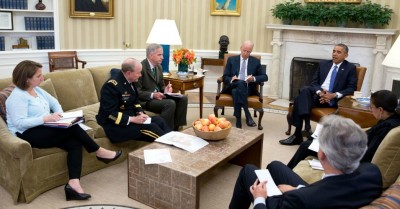Attack on Iraq Would Violate US Law, Experts Warn

‘An attack on Iraq would violate the Constitution and the War Powers Resolution,” warns Paul Findley, author of War Powers Resolution.
Prominent legal scholars and the key author of the War Powers Resolution—which checks the president’s power to launch military attacks—warned Thursday that an attack on Iraq would violate U.S. law.
Paul Findley, 22 year veteran of the U.S. House of Representatives, who was a key author of the War Powers Resolution, warned in a statement,
“Just as with threats to attack Syria last year, an attack on Iraq would violate the Constitution and the War Powers Resolution. As with any president, he [President Obama] commits an impeachable offense if he does not follow the Constitution.”
Marjorie Cohn, Professor at Thomas Jefferson School of Law, agrees:
Under the War Powers Resolution, the President can introduce U.S. troops into hostilities, or into situations ‘where imminent involvement in hostilities is clearly indicated by the circumstances,’ only after (1) a Congressional declaration of war, (2) ‘specific statutory authorization,’ or (3) in ‘a national emergency created by attack upon the United States, its territories or possessions, or its armed forces.’
This is the current situation: First, Congress has not declared war. Second, neither the 2002 Authorization for the Use of Military Force (AUMF) (which Bush used to invade Iraq), nor the 2001 AUMF (which Bush used to invade Afghanistan), would provide a legal basis for an attack on Iraq at the present time. Third, there has been no attack on the United States or U.S. armed forces. Moreover, the UN Charter only allows a military attack on another country in the case of self-defense or when the UN Security Council authorizes it; neither is the case at the present time.
Passed in 1973, despite former President Nixon’s veto, the War Powers Resolution followed public outrage at the brutality of the Vietnam War.
The warnings followed a speech by President Obama’s delivered Thursday in which he announced he is sending 300 military advisers and “preparing to take targeted and precise military action if and when we determine situation on ground requires it.”
Francis Boyle, professor at the University of Illinois College of Law, warns,
“This could escalate in any number of ways — exactly what the War Powers Resolution was supposed to stop. It’s not legitimate for the president — or members of Congress — to make arrangements that violate the Constitution and the War Powers Resolution.”
He added,
“Obama just stated that the 300 U.S. troops would be doing training, but CNN reports his spokesperson Jay Carney stated they would also ‘provide airfield management security and logistic support.’ Does this mean that they will become the required forward air controllers for the targeted and precise military action that Obama says he is preparing? If the U.S. is going to target ISIS, will it be limited to Iraq or will it eventually go into Syria?”

